Hamza Furious singer of war with basmahstvo
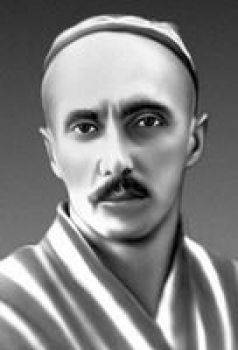 One such person was Hamza Hakim-zade Niyazi. “Frantic Hamza,” as his contemporaries called it, can be named among the pioneers of Soviet power in Uzbekistan, but it is much better known as a classic of Soviet Uzbek literature and theater. Khamza not only laid the foundations of Soviet Uzbek literature, but also stood at the origins of front-line theater troupes on the Turkestan front during the Civil War. Ultimately, it was precisely for his cultural and educational activities that Khamza gave his life - in 1929 he was brutally murdered by a group of religious fanatics in the village of Shakhimardan, in the territory of the Ferghana Region. The activities of the "frantic Khamza" to denounce local nationalists and Basmachi, the struggle for the rights of women, the desire to enlighten the Uzbek and other peoples of Central Asia - all this contributed to the growth of hatred of Khamza among the conservative part of the Central Asian population. It is clear that in Soviet times, the image of Khamza Niyazi was praised in every possible way - a city in the Ferghana region and the Tashkent region, streets and squares were named in his honor, Khamza museums were opened, and numerous adult and children's literature were printed about him. Now all this is in the past. In modern Uzbekistan, Khamza, like other political and cultural figures of the Soviet past, who contributed to the strengthening of ties between the Uzbek and Russian peoples, is no longer considered worthy of respect historical figure. In 2012, the city of Khamza in the Ferghana region was renamed - it began to bear the name Tinchlik, and in 2014 the Khamzinsky district of Tashkent was renamed the Yashnabad district. It is all the more important to recall this interesting person, the history of his life and death, since for many modern readers his name remains extremely little known.
One such person was Hamza Hakim-zade Niyazi. “Frantic Hamza,” as his contemporaries called it, can be named among the pioneers of Soviet power in Uzbekistan, but it is much better known as a classic of Soviet Uzbek literature and theater. Khamza not only laid the foundations of Soviet Uzbek literature, but also stood at the origins of front-line theater troupes on the Turkestan front during the Civil War. Ultimately, it was precisely for his cultural and educational activities that Khamza gave his life - in 1929 he was brutally murdered by a group of religious fanatics in the village of Shakhimardan, in the territory of the Ferghana Region. The activities of the "frantic Khamza" to denounce local nationalists and Basmachi, the struggle for the rights of women, the desire to enlighten the Uzbek and other peoples of Central Asia - all this contributed to the growth of hatred of Khamza among the conservative part of the Central Asian population. It is clear that in Soviet times, the image of Khamza Niyazi was praised in every possible way - a city in the Ferghana region and the Tashkent region, streets and squares were named in his honor, Khamza museums were opened, and numerous adult and children's literature were printed about him. Now all this is in the past. In modern Uzbekistan, Khamza, like other political and cultural figures of the Soviet past, who contributed to the strengthening of ties between the Uzbek and Russian peoples, is no longer considered worthy of respect historical figure. In 2012, the city of Khamza in the Ferghana region was renamed - it began to bear the name Tinchlik, and in 2014 the Khamzinsky district of Tashkent was renamed the Yashnabad district. It is all the more important to recall this interesting person, the history of his life and death, since for many modern readers his name remains extremely little known. Kokand youth
Hamza Hakim-zade Niyazi was born on March 7, 1889, in Kokand. By this time, Kokand 13 years already was part of the Fergana region of the Russian Empire. The Fergana region was formed after the conquest and abolition of the Kokand Khanate - one of the three feudal state formations of Central Asia that existed on the eve of the Russian conquest of the region. Kokand has become a district center in the Fergana region. It so happened that it was Kokand - the former capital of the abolished Kokand Khanate, which fiercely resisted Russian expansion, and the center of the Fergana Valley, known to the most conservative and religious-minded population, at the same time became the center of advanced Uzbek culture. Such classics of Uzbek literature as Mukimi and Furkat worked here, and the life and career of Hamza Hakim-zade Niyazi began here. Khamza's father, Niyaz-Ukhla anglers, was born in 1836 year, and sixteen years old he left his father's house and went to Bukhara, where he mastered the craft of a doctor. When he returned, he married the mother of Hamza and became engaged in traditional sorcery. Since Hamza's father Hakim-zade Niyazi was a doctor, the boy decided to be educated. Hamzu was taught to read and write in Uzbek and Persian. He enrolled in a maktab, a traditional Muslim elementary school, then in a local madrasa.
While still studying at the Maktab, Hamza began writing poetry. He composed his first poems in 1899, at the age of ten, inspired by the examples of Mukimi and Furkat. Muhammad Aminhodja Mukimi (1850-1903) was Hamza's senior countryman. He was born and died in Kokand, was educated at the famous Mehtar Ayim Madrasah in Bukhara. It is Mukimi who is considered the founder of Uzbek realism, since he made significant adjustments to Uzbek literature, constantly participating in sharp controversy with supporters of the conservative style of Uzbek literature. Mukimi was very interested in Russian literature and culture, he believed that Uzbek culture should be enriched by studying Russian culture. He also adhered to democratic views, not hiding sympathies to simple workers and risky revealing bais and clergy in his poems. Zakirjan Furkat (1858-1909, pictured) - Hamza’s senior contemporary and also his compatriot, a native of Kokand, was also one of the most prominent Uzbek poets and publicists of the time. Unlike many other Central Asian cultural figures, Furkat was pro-Russian and recognized the need to learn Russian language and culture, as well as, in general, the need for a total modernization of Uzbek society. Admiration of Russian culture, Russian weapons, Russian history and heroes is one of the favorite themes of Furkat's poetry: “I am reproached that my passion is not restrained, that I have too much praised Russia. No, I don’t lie, I praise her fighters, the whole earth knows about their courage ”(Furkat. About the power of the Russian troops // Zakirjan Furkat. Favorites. Tashkent, 1981).
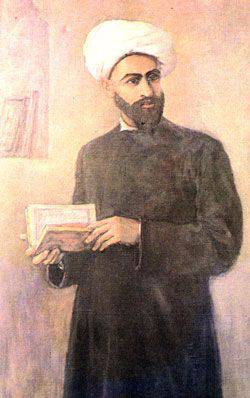 Naturally, Hamza, brought up on such verses from a young age, also became imbued with confidence in the need to develop cultural ties with Russia, borrowing advanced cultural experience. Studying in the madrasa Hamzu, because he wanted to continue his education in a more modern school. But doctor Niyaz had no money for the education of his son.
Naturally, Hamza, brought up on such verses from a young age, also became imbued with confidence in the need to develop cultural ties with Russia, borrowing advanced cultural experience. Studying in the madrasa Hamzu, because he wanted to continue his education in a more modern school. But doctor Niyaz had no money for the education of his son. Beginning of the path of the poet and revolutionary
Only in 1908, Khamza was able to get to study in Namangan, where he studied for eight months and met Abdullah Tokmullin, a local educator. At about the same time, Hamza receives the first information about what happened in Russia in 1905-1907. events. Revolutionary ideas penetrated into Central Asia through Russian specialists - engineers and workers, but more with the Uzbek population, given the linguistic proximity, the Tatars were in contact. One young Tatar, who produced leaflets and brochures on a manual loom, introduced Hamzu Niyazi to revolutionary ideas. Young Hamza immediately became interested in revolutionary ideas and even wrote a small novel “Which side is true?”. In his autobiography, Hamza mentions that the novel was later stolen and no longer found. It was during this period that the formation of the national revolutionary views of Hamza Hakim-zade Niyazi took place. However, since there was no opportunity for his family to receive a secular education, in 1909, Hamza went to Bukhara, the then center of Central Asian Muslim culture. There, Hamza intended to complete the study of Arabic from the famous mentor Ikramchi-domly, but the young man’s plans were hindered by violent clashes between the Bukharan Sunnis and the Shiites living in the city - “irony”, that is, Iranians. In an effort to avoid participation in clashes, Hamza left the city. About a month he worked in a printing house in Kagan, and then moved to Tashkent, where he opened his own school. Thus, with 1910, Mr. Khamza began teaching in Tashkent, not forgetting about literary activity. By this time, a large number of Russian and Russian-speaking people already lived in Central Asia, among them were workers or small servants who sympathized with revolutionary ideas. Gradually acquainted with them and Hamza.
At that time, Jadidism was gaining momentum in Turkestan. The Jadids (from the Arabic “Jadid” - the new one) was a socio-political and cultural-educational movement that spread at the turn of the XIX - XX centuries. among the Turkic-speaking and Muslim peoples of the Russian Empire, including among the Uzbeks. The Ottoman Young Turks had the greatest influence on the development of the Jadid movement. Jadids themselves advocated the reform of Muslim societies through the adoption of best practices and cultural achievements of European countries. Understanding the inadmissibility of further preservation of the medieval social order in Muslim societies, the Jadids did their best to spread European culture among their peoples, naturally with some reservations. According to the Jadids, such European political institutions as parliamentarism did not contradict Islam, nor did the development of secular school and post-secondary education. Among the representatives of the conservative Muslim clergy, the activities of the Jadids provoked outright rejection, but the latter quickly enough managed to win over the sympathies of the emerging Muslim bourgeoisie and part of the aristocracy, who recognized the need for social modernization of Muslim societies. The greatest success in reforming the education system was observed among the Tatars, Bashkirs and Kazakhs. Modernization transformations in Central Asia were less successful among Uzbeks, and the Jadids were least affected by Tajiks and Turkmen. In Uzbekistan, Munavar-kar Abdurashidhonov (1878-1931), Makhmud-Khoja Behbudi (1875-1919) and Fayzullo Khodjaev (1896-1938) became the most important figures of the Jadid movement. From 1905, Behbudi participated in the activities of the All-Russian Muslim Party “Ittifak”, created his own book publishing house in Samarkand, and also actively manifested himself as a playwright. In 1911, he wrote the drama “The Fatherfighter”, which is considered the pinnacle of Behbudi's literary work.
The activities of the Jadids aroused great interest of all modern and gifted Uzbek youth, and Hamza Hakim-zade Niyazi, who also understood and supported the need to modernize the education system, was no exception. In 1911, he opened an evening school in his native Kokand, to which he invited a teacher-girl. Probably, it was the first teacher to teach Kokands. And, most surprisingly, by nationality the girl, who was called Ksenia, was Russian. Naturally, Hamza’s father Niyaz accepted with great doubt the marriage of his son to a Russian girl. However, as an enlightened person, he did not hinder Hamze. Another thing - the representatives of the conservative clergy. The public of Kokand was outraged by the fact that a young teacher, Khamza, had married not only a non-robe, but also a non-Muslim. A marriage with Xenia turned out to be impossible to register. An Orthodox priest would not marry a girl with a Muslim, and the mullah would not marry a Christian.
In the end, Hamza wrote a letter to Ufa, seeking advice from the local spiritual authorities. But they too were adamant, demanding the adoption of Islam by a girl. In the end, Xenia humbled herself and, because she had a great love for Hamza, decided to convert to Islam. The young began to live in Hamza’s father’s house, but even the adoption of Islam by Xenia did not help her win the sympathy of the local spiritual authorities. They continued to put pressure on Hamza Niyaz's father - they demanded that he influence his son and force him to leave his Russian wife. They also succeeded in closing the school that Hamza organized - again, referring to the fact that Hamza teaches "the wrong thing", and, naturally, the wife’s nationality was remembered. In the end, Hamza went traveling around the world. For local religious leaders it was an excuse - he went, they say, on a trip to the holy places. During a long journey through the countries of the East, Hamza visited Afghanistan, Mecca and Medina, Damascus, Beirut, and Istanbul. In 1914, he returned home, but he no longer found his wife or his son, who was born shortly before his departure. Her father told Khamze that Ksenia, unable to stand apart, took her son and left Kokand with him forever. Somehow reconciled with the loss of his family, Hamza in October 1914 reopened the school in Kokand - this time, raising funds from benefactors, he began to enlighten the Kokand orphans. However, the funds received from the well-wishers did not last long - gradually patrons cooled off towards the financing of the school, especially since the First World War and the deterioration of the economic situation of the country affected the Fergana region.
At the origins of the Uzbek theater
However, Hamza did not lose heart. He switched to literary activity, decided to try himself as a playwright. Moreover, in February 1915 for the first time in its history arrived in Kokand theater under the direction of Mahmudhoji Behbudi (1875-1919). Amateur theater troupe “Turon” in 1914 was created by Uzbek Jadids led by Abdullah Avloni. Kokand greeted the national theater with a full house. The tickets were sold out, and a crowd of thousands of Kokands gathered at the premise where the performance was to take place. Hamza also attended the show, but he had a low opinion of him. But friends began to persuade him to write a play. But the beginning of the theatrical movement in Uzbekistan caused a sharply negative reaction from conservative circles, first of all, the clergy and some of the bais. The clergy launched a real campaign against the theater "Turon", accusing the troupe that its actors turn people into jesters and commit ungodly actions. It should be noted here that the folk theatrical and musical culture has never been welcomed in the Central Asian khanates. Secular feudal lords and clergy saw in theater culture dangerous manifestations of free-thinking. The most negative attitude towards artists, wandering musicians, fakirs was strengthened in the Kokand Khanate, which included Fergana Valley before the Russian conquest. Kokand rulers used repressive measures against the “Bohemian”. It should be noted that in the same Bukhara attitude towards musicians and artists was more loyal. Thus, the Emir Muzaffar Khan (1860 — 1885), on the contrary, ordered the activities of musicians and artists and ordered them to receive permits for performances, and also imposed a special tax on traveling bands. However, even after several decades of Russian rule in Turkestan, the local clergy was extremely negative about theatrical art. Therefore, the theater troupe, created by the Jadids, immediately provoked numerous protests from religious figures. As modern researcher Alexander Jumaev notes, “official Islam sought to give these types of art an extremely low social status, considering them primarily as a means of entertaining the crowd. In some publications of that time, the idea was even expressed that the distribution of musicians among the people was a sign of the approaching end of the world (Ocher zamon). At best, music was considered to be frivolous and unworthy of a Muslim ”(quoted in Jumayev A. Islam and Culture in Central Asia // http://magazines.russ.ru/druzhba/2008/12/dm8.html). Naturally, the Uzbek conservative public, having learned about the activities of the Jadids in creating a theater, took all possible measures to prevent the further development of the national theater. First, the conservatives decided to act by peaceful means.
- Maktab School in Central Asia
The delegation of the clergy arrived to Munavar-kary Abdurashidkhonov, the leader of the Tashkent jadids, but he refused to forbid his followers to play in performances - after all, nothing that contradicts Shari'a norms, the Islamic teachings and the social order existing in the Russian Empire, Munavar-cars in the theater’s activities saw. Then conservative circles managed to provoke a crowd of Andijan residents, where the troupe was performing at the time, to pogrom. After the riots, the city authorities immediately ordered the actors to be expelled outside Andijan. Also, in order not to provoke the reaction of the clergy and the people, it was decided to close all fourteen new-method schools, in which instruction was carried out not according to the traditional rules, but according to Russian standards. But the Andijan events did not affect Hamza and his comrades - he took the risk and organized his own theater performance for the first time. Khamza’s play The Poisoned Life narrated about the difficult female share in the Uzbek family - the girl was married to a rich ishan against her wishes, and the young man in love with her could not help it. A typical problem for the Uzbek society of those years. The very first performance of the Khamza Theater in his native Kokand provoked a strong public reaction. The youth rather approved the play, since many were aware of the problems raised in it. But the conservative circles of Kokand were furious. Delegates of the Kokand clergy came to his father Niyaz with complaints about the improper upbringing of his son. The old doctor promised to talk with his son, but Hamza did not follow the promptings of his parent and soon a show was held again in Kokand - this time the theater troupe staged a new comedy “Modern Wedding” and the same scandalous play “Poisoned Life”. The enraged elders again visited Niyaz and demanded that the healer curse their own son - under the threat of weaning Niyaz himself. Not a single resident of Kokand would no longer go to old Niyaz’s treatment, they wouldn’t allow a doctor and not a single city mosque in Kokand. For the right, educated in the traditional views of the Uzbek, as was Niyaz, such threats were a very effective way of pressure. And the doctor Niyaz surrendered. Hamza had a difficult time experiencing his father’s curse, but did not stop theatrical activities — he wrote a new play and sent it to Tashkent, Munawaru-kary. The Jadid leader did not hesitate to answer - he agreed to accept the play only when Hamza removed the negative epithets about the bais and the clergy. Hamza refused, and the play remained unpublished. However, it didn’t hurt the poet and playwright much - even then Hamza preferred to remain faithful to his views, and not go on about his own benefit.
Hamza, Jadids and the February Revolution
In 1916, Khamza moved to Margilan, where he again opened a school for poor children, in which he intended to organize an educational process according to Russian standards. However, immediately after the establishment of the school, there was an order from the city authorities of Margilan - close the school! Hamza was forced to leave the city and return to his native Kokand, where everyone already knew him as "a dangerous troublemaker, cursed by his father." Meanwhile, social tensions in the Fergana Valley grew. Not only was there a poor harvest of cotton in 1916, but also tens of thousands of young men were mobilized by the tsarist government for rear and front-line work. As you know, the Muslims of Turkestan were freed in czarist Russia from universal conscription. They served only the nobles, and then - as you wish. But, faced with a shortage of human resources, the tsarist government decided to cover the lack of workers for the construction of defenses at the expense of the inhabitants of Central Asia. Front-line jobs sent poor dehkans, day laborers and farm laborers, and everyone who could buy it off, did it safely and avoided tribute by paying the right amount to local corrupt officials. Naturally, the mobilization caused outrage of the peoples of the region, especially given the fact that a significant part of the Turkestans could avoid conscription precisely because of their financial capabilities. In the cities of Turkestan, unrest began in the lower social strata, subject to forced mobilization. Nor did they pass on their native Hamze Kokand, where mass protests against labor service also took place. Hamza, who was already a “social poet” at that time, could not help but respond to what was happening - he was constantly working on new and new poems, trying to express his attitude to the events in Central Asia and in the Russian Empire. The February 1917 revolution in Russia had a tremendous impact on the political situation in Central Asia. The settled order was under threat, the conservative circles were in extreme concern, but the Jadids welcomed the revolutionary events, counting on the realization of their ideas.
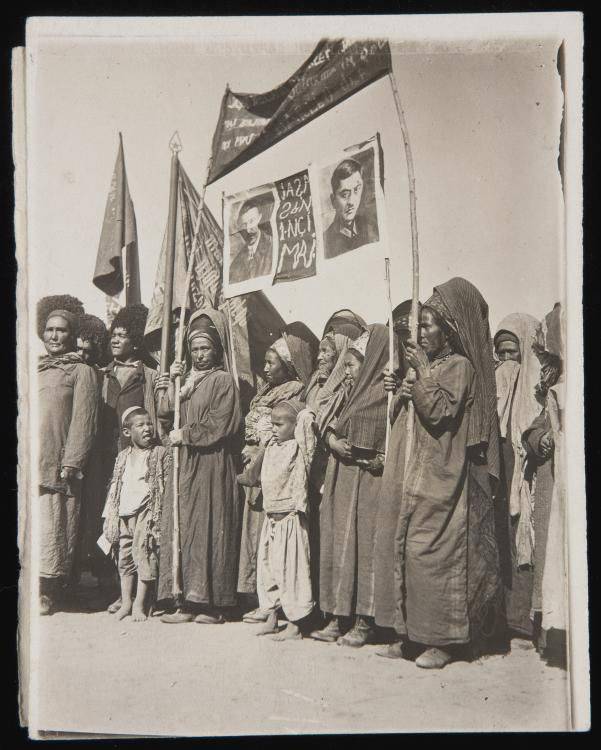
6 and 9-13 March March 1917, on the initiative of the Jadids of Tashkent, thousands of meetings were held in the “old city”. The Jadids formed the Tashkent Executive Committee of the unified delegates of the Muslim population. A representative body, Shuroi Islamia, was formed at the meetings. Its membership included approximately 60 delegates. In contrast to the Soviets of Workers 'and Soldiers' Deputies, which united the Russian and Russian-speaking population, the representatives of the Uzbek, Tajik, and Kazakh population of Tashkent were included in Shuroi Islamia. 14 March 1917 was elected to the presidency of the Shuroi Islamia, which included the well-known “Jadid patriarch” of Munawar-kar Abdurashidkhanov. 31 March at the joint meeting of the Tashkent Council of Workers 'and Soldiers' Deputies, the Council of Muslim Deputies, the Council of Peasant Deputies and the Tashkent Executive Committee, it was decided to remove from office the Governor-General, his assistant and chief of staff. They were decided to be placed under house arrest, and in their place new acting commander-in-chief and chief of staff were elected. The provisional government of Russia 7 on April 1917 formed the Turkestan Committee consisting of 9 members. The main political issue discussed in these days in Turkestan was the future structure of an autonomous region within Russia. Supporters of social reform of Turkestan society also became more active. Thus, from May to August 1917, in Tashkent, Kokand, Andijan, Samarkand, and other cities and towns of Turkestan, “Councils of Muslim Workers' Deputies”, “Unions of Muslim Workers” were formed. Conservatives also proposed their projects of reorganization of Turkestan - they saw Turkestan as a theocratic autonomous entity of the peoples of the region as part of the Russian state, life in which would be arranged in accordance with Sharia law.
Hamza Niyazi also completely plunged into the turbulent maelstrom of public life. He became the editor of Kengash magazine - Council, which, however, was under the control of moderate-minded circles of the Kokand bourgeoisie. Disagreement with the publishers of the magazine on a number of key issues, and first of all about the attitude to the clergy and bays declared by Khamza, however, soon became the reason for his resignation from the post of the responsible editor. Hamzu, in the period between February and October 1917, was very concerned about the question of what Turkestan will become in the near future, whether it can get rid of the power of the bais and the clergy, or radical improvements in the lives of the people will not happen. Hamza himself, naturally, did not have a clear idea of how the “society of the future” should be organized, but he did his best to promote positive social change. In particular, he tried to create a consumer society in Kokand, in which the poorest Kokand people were to unite, then the workers' society. Neither one nor the other projects of Hamza, however, did not receive real life. Ultimately, Hamza moved to the city of Turkestan, where he got a job at the factory as a simple worker. There, making friends with the Russian workers who worked at the enterprise, Hamza met the events of October 1917 of the year. After returning to Kokand, Hamza found his father an aged and seriously ill person, but Niyaz, who had whispered those terrible words “curse” in the presence of the elders, this time was friendly to his son. Hamza settled in his father's house, continued to write - and poems, and songs, and prose. After the establishment of Soviet power in Turkestan, Hamzu was invited to Fergana - the first Soviet school was opened here, which means that a good, competent and revolutionary-minded teacher was needed. Hamza gladly responded to the invitation and left his native Kokand.
Agitation Front Civil
However, in Fergana, he had to face new challenges - local residents would not allow children to enter the Soviet school. Spiritual authorities claimed that in this school children would be taught immorality, forced to deny parental authority, forget the customs of their ancestors. School teachers, including Khamze, had to persuade respectable heads of families to let their children go to school. Together with his colleagues, Hamze had to repel the school building during the next raid on Fergana basmachs. In March, 1918, the city of Hamza, founded one of the first amateur groups in Ferghana. It should be noted that by this time Muhitdin Kari Yakubov, created in 1916, already existed in Fergana at the city Union of Clerks. It consisted of young Uzbeks who learned to play European wind instruments under the guidance of a Russian musician from the military band of the Fergana garrison. After the establishment of Soviet power in Fergana, Kari Yakubov asked for a detachment of I.G. Grigoriev. Hamza Niyazi joined the team. The first performance of an amateur troupe took place on May 1, 1918, in the city's Muslim Club. Soon after its creation, the theater troupe was accepted into the service by the Political Administration of the Turkestan Front and began performing in front of the Red Army units. Transcaspian, Fergana, Ashgabat, Orenburg and other fronts served agitation trains, which included theatrical groups, including the Khamza team. Basically, the band represented plays and songs written by Hamza Hakim-zade Niyazi himself. Prior to 1920, he was on the Kyzylarvat (Transcaspian) front, performing a variety of duties - from a teacher of literacy courses and an agitator to a theater actor and a prompter. In 1920, Khamza Hakim-zade Niyazi joined the Russian Communist Party (Bolsheviks), was appointed to head the boarding school in Kokand, then again led the theater groups that performed in front of military units deployed in the Fergana direction.
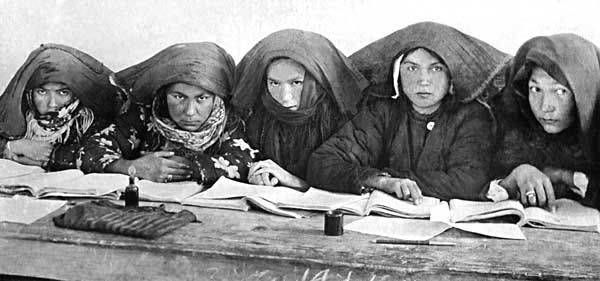
In 1921, Khamza received a referral to Bukhara and Khiva to collect material for upcoming artistic works. In Bukhara, Khamza set up a theater troupe at the local department of public education, also engaged in propaganda and mass cultural work among Red Army men. From the end of 1921, he was in Khorezm, where he worked in the cultural and educational department of the trade union, then in the department of public education. Later, until July 1924, Hamza worked in the Khodzheylinsky district - in a boarding school for Kazakh children, and then returned to the disposal of the Fergana regional committee. There he was assigned to revive the theater troupe in Kokand. The staff of the troupe was defined in 25 people, and its provision was assumed by the Soviet state. At first the troupe put on Hamza’s plays, and then the premiere of the play “The Marriage” by Gogol was staged. The play made a great impression on the Kokands, but soon after the premiere Hamza had a talk with representatives of the Fergana Council of People's Commissars. Nationalists, which at the beginning of the 1920's. It was not so little in the composition of the Soviet authorities in Central Asia, they wondered why the play of the Russian author Gogol, and not the Uzbek authors, was staged in Kokand. And they had to give Hamza is hard enough, but reasoned resistance. Gradually, under the direction of Hamza, the Kokand Theater became one of the most famous and prominent in Turkestan. He was taken as the basis of the Central State Troupe and included artists of the Tashkent exemplary troupe. As the Soviet art historian Abdulazim Khusainov noted, “Khamza spiritualized national artistic traditions and the warehouse of national artistic thinking with new revolutionary social ideas, demonstrating in creative practice how much organic and creatively productive the fusion of traditional social ideas could be. - sharpened realistic art "(quoted in: Khusainov A. A. Khamza and amateur theater of Uzbekistan. Dis. Candida that art history. Minsk, 1984).
Death in Shahimardan
Then, by decision of the CEC Chairman of Uzbekistan Yuldash Akhunbabaev, Hamza was sent to Shakhimardan. This village in the Fergana region was famous for its Blue Lake, but here there was also a grave revered by Muslims of all Turkestan - one of the seven possible graves of Caliph Ali. Naturally, this village, considered sacred by the inhabitants of Central Asia, was the center of gravity of all believers, and conservative sentiments were very strong here. In such a difficult situation, Hamze Hakim-zade Niyazi had to work - to carry out revolutionary propaganda among the local population, which was entirely under the influence of the conservative clergy. But despite this, Hamza remained in Shahimardan. In Shakhimardan Hamza worked extensively with the locals. He called for children to be sent to Soviet schools, fought against the oppression of women, primarily with forced marriages, bans on education, the practice of selling brides. Khamza’s plays The Tricks of Maysaras (1926) and Secrets of the Burqa (1927) are devoted to women in Uzbekistan. Periodically, he visited his native Kokand, arriving as a delegate from Shakhimardan to the district congress of councils of people's deputies.
In Shakhimardan itself, meanwhile, clouds were gathering over Khamza. Local authorities - Ishans and Khoja - decided to get rid of the dangerous agitator as soon as possible. 8 March 1929, Hamza held the first meeting of women in Shakhimardan, and on this day twenty-three women from one of the most conservative villages in Uzbekistan dropped the veil. Such conservative circles could not forgive Hamza. 18 March 1929 of the year on Hamzah Hakim-zade, on one of the Shakhimardansk streets, was attacked by a crowd of religious fanatics. A stone launched into the temple by the playwright and the poet knocked him down. And then already acted brutal crowd. Hamzu was beaten to death with stones and sticks, and then his bloody body was thrown into the fields. So one of the first classics of Soviet Uzbek literature ended his life. He was only forty years old. Later, Shakhimardan was renamed Hamzaabad, a mausoleum of the poet and playwright was built in the village, and a museum was opened in his name. 1977 to 1984 director Shukhrat Abbasov shot the serial “Fiery Roads” based on the novel “Hamza” by Kamil Yashen and the story “Furious Hamza” by Lyubov Voronkova. Throughout the Soviet period in the history of Uzbekistan, Hamza Hakim-zade Niyazi remained one of the symbols of Soviet power in the republic. The significance of the cultural and educational activities of Hamza Hakim-zade Niyazi for the Uzbek people was not questioned.
After a hundred years, Hamza is again in disgrace
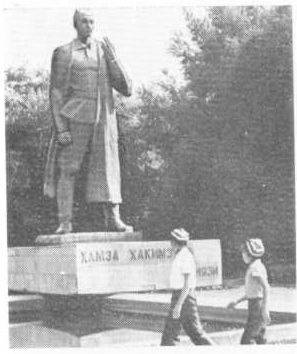 The situation changed after the collapse of the Soviet Union and the declaration of political independence of Uzbekistan. Gradually, all the achievements of the Soviet past were destroyed, but the state ideology did not fail to accuse Russia and the Soviet Union of expansionism, of violating the traditional way of life of the Uzbeks. Accordingly, they tried to erase from people's memory and everything that symbolized the Soviet era in the history of Uzbekistan. One of the first targets was Hamza. No wonder - after all, he, an ethnic Uzbek, constantly spoke about the need to enrich the Uzbek culture at the expense of the Russian experience, proclaimed the need for social and cultural changes in the life of Central Asia. The post-Soviet Uzbek authorities tried to erase the memory of Khamze - the settlements, districts and streets named after him were renamed. Back in the beginning of the 1990, a monument to Hamze Niyazi was demolished, standing opposite the building of the Tashkent Medical Institute. The Uzbek National Academic Drama Theater has lost the name of Hamza Hakim-zade Niyazi. In 2014, the Khamza district of Tashkent was renamed, which we already mentioned at the beginning of the article. Hamza Hakim-zade's most popular work, The Bai and the Batrac, has virtually disappeared from the repertoire of the Uzbek theaters - well, you can draw a lot of parallels with the current socio-economic and political situation in Uzbekistan. A lot has been done to discredit the image of Hamza in the eyes of modern Uzbek youth. So, they started a rumor that Hamza was allegedly a homosexual - and this despite the fact that at different times he had three wives: the first was an Uzbek, then, after spending, a Russian, then a tribe again. Actually, the discrediting of the image of Khamza aims not only to discredit the poet and playwright himself, but to cast a shadow on the very idea of friendship between the peoples of Central Asia and Russia, that during the Soviet period national history was done for this region as much as it was not done. over the centuries of the existence of independent Central Asian khanates.
The situation changed after the collapse of the Soviet Union and the declaration of political independence of Uzbekistan. Gradually, all the achievements of the Soviet past were destroyed, but the state ideology did not fail to accuse Russia and the Soviet Union of expansionism, of violating the traditional way of life of the Uzbeks. Accordingly, they tried to erase from people's memory and everything that symbolized the Soviet era in the history of Uzbekistan. One of the first targets was Hamza. No wonder - after all, he, an ethnic Uzbek, constantly spoke about the need to enrich the Uzbek culture at the expense of the Russian experience, proclaimed the need for social and cultural changes in the life of Central Asia. The post-Soviet Uzbek authorities tried to erase the memory of Khamze - the settlements, districts and streets named after him were renamed. Back in the beginning of the 1990, a monument to Hamze Niyazi was demolished, standing opposite the building of the Tashkent Medical Institute. The Uzbek National Academic Drama Theater has lost the name of Hamza Hakim-zade Niyazi. In 2014, the Khamza district of Tashkent was renamed, which we already mentioned at the beginning of the article. Hamza Hakim-zade's most popular work, The Bai and the Batrac, has virtually disappeared from the repertoire of the Uzbek theaters - well, you can draw a lot of parallels with the current socio-economic and political situation in Uzbekistan. A lot has been done to discredit the image of Hamza in the eyes of modern Uzbek youth. So, they started a rumor that Hamza was allegedly a homosexual - and this despite the fact that at different times he had three wives: the first was an Uzbek, then, after spending, a Russian, then a tribe again. Actually, the discrediting of the image of Khamza aims not only to discredit the poet and playwright himself, but to cast a shadow on the very idea of friendship between the peoples of Central Asia and Russia, that during the Soviet period national history was done for this region as much as it was not done. over the centuries of the existence of independent Central Asian khanates.
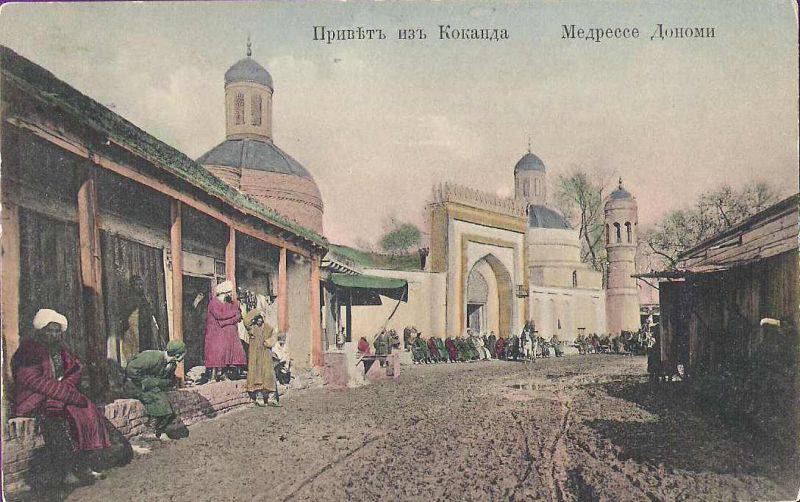
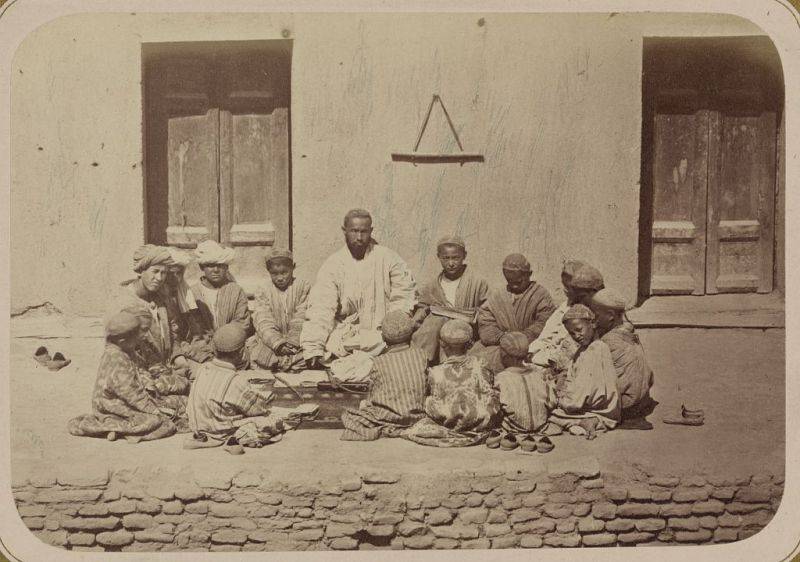
Information